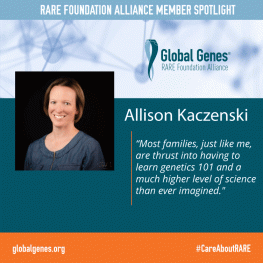Name: Allison Kaczenski
Organizations you represent: SATB2 Gene Foundation, Founder and President of Board of Directors COMBINED Brain, Board of Directors
What led you to the rare disease community: My daughter was diagnosed with SATB2-associated syndrome when she was 8 days old, she is now almost 7 years old. At the time of receiving her diagnosis, she was still in NICU and we were given one case study and told she was one of twenty in the world. For the first two years of her life, we didn’t really know anything about the “rare world” and were hyper focused on getting the care she needed, managing 12 doctors, four surgeries, countless testing and evaluations, and early intervention therapies. Our biggest hurdle and pain points were getting her doctors to communicate among each other and countless insurance battles. We just kept thinking “it shouldn’t be this hard”. That there had to be a better way to get doctors on the phone together, to advocate with insurance, and coordinate the care needed for a child with a rare condition.
Then two years later we finally found an online group of parents with children with the same diagnosis, there were only about 40 of us in the group. Someone posted about the Global Genes Rare Patient Advocacy Summit and I started to look into Global Genes and received one of the scholarships to attend. I attended the 2016 Summit with the intention to network, learn, and form the SATB2 Gene Foundation. It gave me the confidence that I could do this and that there was a whole amazing group of people and organizations here to help the rare disease community. Our community has now grown to over 500 families globally.
What do you think are the areas that are lacking in the community (specific to your org or in general) / What are some of the pain points? We are seeing more families receive a diagnosis at a younger age, but often those families have to fight hard to convenience their doctors to pursue genetic testing at an early age. The average age of diagnosis seems to be around 3 to 4 years old and if families would be able to receive a diagnosis even earlier, then access to critical early intervention therapies such as PT, OT, and Speech Therapy could be obtained and help.
Most families, just like me, are thrust into having to learn genetics 101 and a much higher level of science than ever imagined. Our communities lack the basic understanding of medical terminology, how to read and understand scientific papers, how to find resources available to them in their state or country such as Medicaid waivers, early intervention, and respite care. Trying to figure out where to start once you have a diagnosis (or even how to get a diagnosis) is overwhelming for most. It’s not for lack of shortage of materials to read, it’s knowing where to start and following the correct path.
I will say that one thing I appreciate the most about being a part of the Global Genes Foundation Alliance is the support system we have built in for rare leaders and the willingness of all of us to share materials and programs to implement for our organizations and communities. The one thing we all need more of is time – and not having to reinvent the wheel time over time is so valuable!
What are your areas of expertise? Prior to launching the SATB2 Gene Foundation I spent my entire career in non-profits and higher education. I received my BA in Arts Management from the College of Charleston where we focused on arts related non-profits and the management of them. My career has focused in large part on fundraising, donor relations and stewardship, donor databases, and event planning. I’ve worked with organizations such as Special Olympics Georgia, Zoo Atlanta, and Emory University. At Emory University I worked on Annual Giving, donor stewardship and event planning – it was a great combination of things I enjoyed working on. At Special Olympics Georgia, I was the Director of Special Events where I led the Law Enforcement Torch Run and coordinated law enforcement agencies across the state of Georgia. That job really helped to shape me with working with volunteers, multi-tasking, and coordinating activities across a large geographic region. And of course, working with the Special Olympics athletes and their families made it all that much more rewarding. I would have never guessed that I would be blessed with a child who will get the joy of participating in Special Olympics in the future.


Stay Connected
Sign up for updates straight to your inbox.
